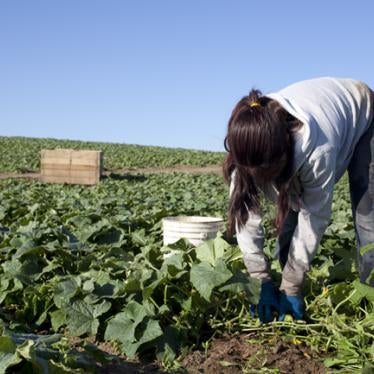Some companies even allow for lower standards of protection for children in their US supply chain than for those elsewhere.
Grace, whose name has been changed to protect her privacy, doesn't smoke – at 15, she's too young to buy a pack of cigarettes, anyway – but she might as well have had a regular habit. At her job on a tobacco farm last summer, she handled tobacco plants for up to 12 hours a day, steadily absorbing nicotine through her skin.
Though precise numbers are hard to come by, it's fairly common to find kids working on US tobacco farms in the summer months (the height of the growing season). Yet while the US has laws to protect kids from the harms of nicotine in cigarettes, there are no restrictions to protect them from nicotine exposure in tobacco fields – despite evidence that such exposure may be especially harmful to children, whose brains and bodies are still developing.
In 2013, my colleagues and I interviewed 141 children who worked on tobacco farms in North Carolina, Kentucky, Tennessee and Virginia, where 90% of US tobacco is produced. In each state, we heard similar stories of sickness and suffering.
Most of the children we spoke to said they got sick while working. Grace explained how she got sick on her first day working in tobacco last summer: "My stomach started hurting. I felt like throwing up," she said, "And then I got a headache." The symptoms she described are consistent with acute nicotine poisoning, a well-documented condition also known as Green Tobacco Sickness.
Many of the children we interviewed labored for 50 to 60 hours a week in sweltering heat, often without shade. Some described how pesticides – known neurotoxins with the potential to cause long-term neurological and reproductive damage, among other harmful effects – drifted over them as tractors sprayed in fields where they worked, causing their eyes and skin to itch and burn.
"Your hands get really dirty," Grace said as I followed her down a row of tobacco plants six feet tall and watched as she snapped off large white and pink flowers to help the tobacco plants grow. "They get black."
But it wasn't just dirt on her hands: they turned black in part from the toxic residue of nicotine and pesticides.
Other teenage workers described hacking down tobacco plants with axes, sometimes cutting their legs and hands, and climbing several stories into the eaves of barns to hang tobacco plants to dry, without any protection from falls. One boy I met lost two fingers on the job after he was suspended in mid-air to trim seedlings with a mower.
Under US law, children are not permitted to work until they are at least 14, and there are strict limits on the hours they can work and the jobs they can do, except in one industry: farm work. As long as a parent gives permission, a child as young as 12 can legally be hired to work on a farm for any number of hours– and there are no special protections for children working on tobacco farms.
The worlds largest tobacco companies purchase tobacco grown in the United States – companies like Altria Group (parent of Philip Morris USA), British American Tobacco, China National Tobacco, Imperial Tobacco Group, Japan Tobacco Group, Lorillard, Philip Morris International and Reynolds American. Most of those tobacco companies told us that they are concerned about child labor in their supply chains.
But their current approaches do not sufficiently protect children from hazardous work and some companies allow for lower standards of protection for children in their US supply chain than for children working on tobacco farms in other countries.
Grace, however, was happy to have a summer job and be earning money. When I asked why she started working in tobacco, she said, "I just wanted to help out my mom." Like Grace, most of the kids we interviewed used their earnings for school supplies, for clothing or to help their parents pay the bills. But earning money for basic needs shouldn’t expose a child to nicotine and pesticides, not to mention debilitating, or even fatal, injury.
There are those who say that there have always been kids working on tobacco farms in the US, or that certain jobs on tobacco farms are safe for kids. But given the hazards and the unique vulnerability of children, a tobacco farm is no place for a child to work.
Tobacco companies should make it clear that they will not buy tobacco from farms that use child labor, and support alternative educational and employment opportunities. And Congress should enact laws restricting child labor in tobacco fields.
In the meantime, children across the southeastern US are preparing for yet another long summer in the tobacco fields.








